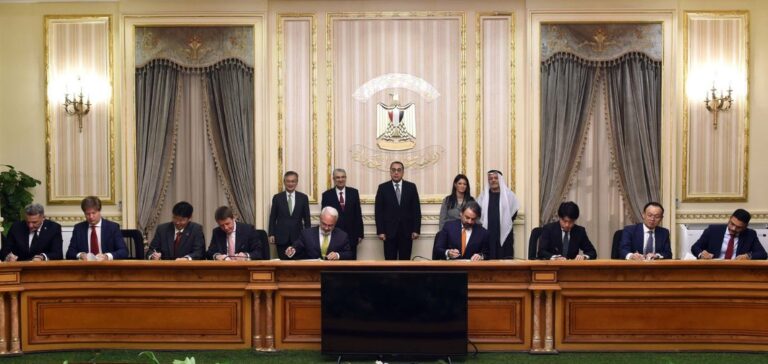In Egypt, AMEA Power signs a $1.1 billion deal to deploy 1GW of wind and solar power at Africa’s largest wind farm .
A strategic agreement
In Egypt, the agreement concluded by AMEA Power in Egypt concerns a 500MW photovoltaic plant. The project also includes a 500MW wind farm estimated to be the largest in Africa. As a result, AMEA Power’s clean energy portfolio will increase to 2GW in the country.
The historic 500MW wind and 500MW solar projects represent $1.1 billion of investment in the Egyptian economy. The 500MW solar photovoltaic power plant will be located in the governorate of Aswan in Egypt. It will receive funding from the International Finance Corporation (IFC).
It is part of the World Bank Group, the Netherlands Bank for Entrepreneurial Development (FMO). In addition, the Japan International Cooperation Agency (JICA) is also involved in the project. The 500 MW wind farm will be located in the Red Sea Governorate.
Sumitomo Corporation will hold 40% of the project’s capital. The financing comes from a consortium of banks. The Japan Bank for International Cooperation (JBIC) and IFC are participating in the financing. Standard Chartered Bank, Commercial International Bank, Sumitomo Mitsui Banking Corporation also join the banking consortium.
Ambitions for Egypt
The two projects developed in Egypt already have Power Purchase Agreements (PPA) with the Egyptian Electricity Transmission Company (EETC) and usufruct agreements. The New and Renewable Energy Authority (NREA) is finalizing its feasibility studies. In addition, AMEA Power recently signed a memorandum of understanding with the Egyptian government.
This agreement was reached on the sidelines of the United Nations Climate Change Conference (COP27) in Sharm el-Sheikh. The objective is to develop a large-scale renewable hydrogen project. The project will be used as a feedstock for the production of ammonia.
Once completed, the 1 GW plant will be able to produce 800,000 tons of green ammonia per year for export. The projects undertaken by AMEA Power are aimed at supporting Egypt’s green ambitions. They also support the economic and social development of the country.
Hussain Al Nowais, President of AMEA Power, states:
“These flagship projects reflect AMEA Power’s commitment, ambition and long-term growth. The company is leading the development of renewable energy across Africa, which, through its global and regional partnerships, will provide clean energy to millions of people across the continent.”
The Egyptian government is working to increase the supply of electricity from renewable sources to 42% by 2035. Therefore, AMEA Power is responding to Egypt’s demand and ambitions.






















